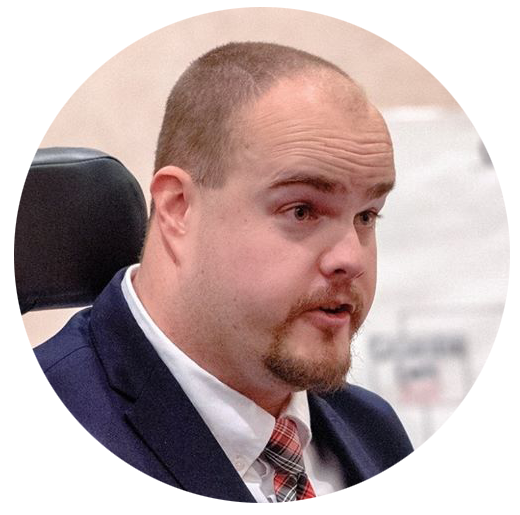
Image adapted from Wikicommons by DhLeaks44 / CC BY-SA 4.0
“God in the Attorney-Client Relationship”
Matthew P. Cavedon
I was taught early on that a criminal defense attorney has to overcome numerous obstacles to win clients’ trust.1 See Criminal Justice Standards for the Defense Function 4-3.1(a) (Am. Bar Ass’n 2017) (“[D]efense counsel should work to establish a relationship of trust and confidence with each client.”). Hurdles include their past difficulties with authority figures. Their fears for the future. Their mental illnesses and chemical dependencies. The instability in their lives. Their friends and family members.
Sometimes, I was trained, the lawyer may even go up against God. This essay is about professionalism when clients’ religious beliefs cause challenges in criminal representation.2See Criminal Justice Standards for the Defense Function 4-1.6 (Am. Bar Ass’n 2017) (encouraging defense lawyers to combat religious bias).
One of the best things about being a public defender is that you never have to go looking for clients. The government brings them right to you. The application process can be so easy, in fact, that I occasionally get a client who does not realize that she requested an attorney. Within this rare set of cases, there is an even rarer subset where the client is not even sure that he wants a lawyer — or wants to do what the lawyer needs him to do — because of his religious faith. “My name is Matt. I will be the lawyer handling your case,” went one of my jailhouse introductions. The reply through the Plexiglas window? “Thanks! But God’s got this. I’m putting it in His hands.” Now, I appreciate the strength and hope that religious faith brings many of my clients. It is what keeps me going sometimes, too. But a difficulty arose when this man answered all of my questions about what happened with nothing more than religious statements. “Where were you when you were arrested?” “Jesus is the Messiah.” “Why were the police out there?” “The Spirit is here with us inmates.” “Can you make your bond?” “I’m not worried about it. He [pointing up] has the money for me.”

Of course, there are possible concerns about a client’s mental health when he cannot give questions relevant, narrative answers. My client’s religious responses could be a manifestation of delusional or otherwise impaired thinking. Part of my professional duty will be to consider whether to file a motion to see if he is competent to move forward with his case.3See Criminal Justice Standards for the Defense Function 4-3.1(c) (Am. Bar Ass’n 2017); Model Rules of Prof’l Conduct r. 1.14(b) (Am. Bar Ass’n 1983) (obligating lawyers to take special care when representing especially vulnerable clients). But even for defendants who clearly do know about their cases and can communicate logically about them, there are times when religion can impact the attorney’s representation. Sometimes, a client — like mine in the example above — simply does not want to talk about the case, out of trust that God will see that everything works out the way it should. The American Bar Association does not have much guidance on what to do in a case like that, leaving it to each attorney to figure out the best angle of approach.4Criminal Justice Standards for the Defense Function 4-5.1(a) (Am. Bar Ass’n 2017) (“Defense counsel should exercise independent professional judgment when advising a client.”). Mine is often to share with my client that I also believe in God. I believe that God calls me to do the work I do. And I see my being there at the jail on any given day, to listen to people and help them, as part of God’s plan for my life. Maybe, I encourage my hesitant client, my being here is also part of how God is going to work things out in your life, too. At least in the case of the man I mentioned before, this nudge brightened his eyes and got him to give me some details. No matter how the lawyer does it, acknowledging the client’s beliefs and speaking to that faith can often get the client to speak back.
Other religious clients might be willing to trust their attorneys, but have no interest in fighting the prosecution, out of respect for authority or a duty of honesty. Here, a lawyer should help the client to consider every side to the case and all of the possible consequences.5Model Rules of Prof’l Conduct r. 1.4(b) (Am. Bar Ass’n 1983) (“A lawyer shall explain a matter to the extent reasonably necessary to permit the client to make informed decisions regarding the representation.”). Maybe the client is guilty and indeed wants to admit to the crime. But maybe — without denying guilt — she can challenge how the police stopped her, in a way that will bring more justice to the community and protect other people. These might also be religious obligations for the client. Or maybe the client can and will admit guilt, but only after negotiations that let her take care of her kids and start rehab. That might help her both obey her conscience and make progress towards what she sees as God’s plan for other areas of her life.6Criminal Justice Standards for the Defense Function 4-1.2(f) (Am. Bar Ass’n 2017) (“Defense counsel should be knowledgeable about, and consider, alternatives to prosecution or conviction that may be applicable in individual cases, and communicate them to the client.”). While a lawyer must “abide by a client’s decisions concerning the objectives of representation,” such as whether to plead guilty or not guilty, he must also “consult with the client as to the means by which they are to be pursued.”7Model Rules of Prof’l Conduct r. 1.2(a) (Am. Bar Ass’n 1983). Including within that consultation those religious and “moral . . . factors that may be relevant to the client’s situation” makes an attorney a better counselor and a better advocate.8Criminal Justice Standards for the Defense Function 4-5.1(d) (Am. Bar Ass’n 2017); see also id. (“Counsel should attempt to distinguish for the client between legal advice and advice based on such other considerations.”).
In a few cases, though, this sort of cooperation will be more than the client’s religious beliefs allow for. There may come a point where the attorney-client relationship is so impaired that meaningful representation is impossible. Withdrawing can be permissible under such circumstances.9Model Rules of Prof’l Conduct r. 1.16(b)(6) (Am. Bar Ass’n 1983) (authorizing withdrawal if client has made representation “unreasonably difficult”). In such cases, as in any withdrawals, care should be taken to protect the client’s interests.10Model Rules of Prof’l Conduct r. 1.16(d) (Am. Bar Ass’n 1983).
Hopefully, however, meeting a client’s faith with your own good faith, whatever you believe, will defuse problems long before withdrawal becomes necessary. Empathy and creativity can often turn a complicated attorney relationship with a religious client into one that is ethically sound and fulfills the needs of everyone involved. ♦

Matthew P. Cavedon is a criminal defense attorney in Gainesville, GA. He graduated from Emory University in 2015 with a law degree and masters of theological studies.
Recommended Citation
Cavedon, Matthew P. “God in the Attorney-Client Relationship.” Canopy Forum, June 26, 2020. https://canopyforum.org/2020/06/26/god-in-the-attorney-client-relationship/

